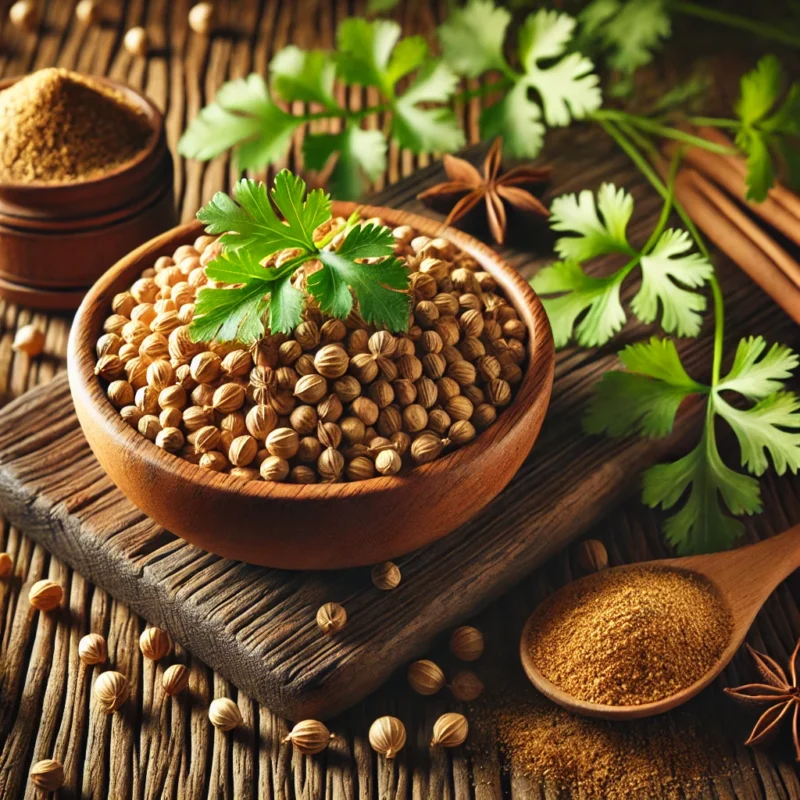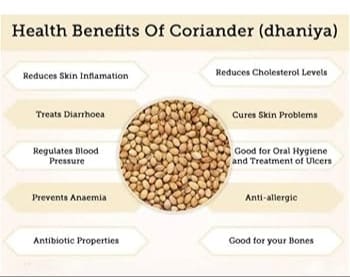Dhania seeds are coriander seeds. People use them for centuries with so many great health benefits and for cooking purposes. The little seeds come from the coriander plant. These are used in so many recipes but also have lots of health-related uses. This blog post will take you through the Coriander seeds benefits, how you can use them, and their possible side effects
What Are Coriander (Dhania) Seeds?
Dried seeds, also known as dhania seeds, are derived from Coriandrum sativum; a plant from the Apiaceae family. The seeds of coriander are tiny, rounded, and contain a slightly sweet flavoring with hints of spice when warm. They are an essential ingredient in cooking dishes, including Indian, Middle Eastern, and Mediterranean meals. Other than this use of coriander seeds for food, people have traditionally used them as medicine, believing them to have therapeutic properties and curing powers.

Health Benefits of Dhania Seeds (Coriander Seeds)
Dhania seeds are rich in nutrients and have been found to offer a wide range of health benefits. Here are some of the main coriander benefits of consuming coriander seeds:

1. Digestive Health
One of the reasons why Dhania seeds become so beneficial is that they help in digestion. Coriander seeds stimulate the production of digestive enzymes, which helps individuals overcome symptoms of indigestion, bloating, and flatulence. On the other hand, nutrient absorption improves, making their presence very valuable in health for a healthy digestive system.
2. Detoxification and Detox Benefits
Coriander seeds have detoxifying properties. They allow the body to remove toxic substances through the promotion of liver and kidney health. The increasing of urine in the body helps in eliminating harmful toxins, which makes the entire body function in a better way and thus reduces the pressure on the detoxifying organs.
3. Blood Sugar Control
Dhania seeds can be very beneficial for those managing diabetes or even for controlling blood sugar levels. Research indicates that coriander seeds can reduce blood sugar levels and enhance insulin sensitivity, making it a useful tool in the management of diabetes. Regular consumption of coriander seeds may stabilize blood sugar and prevent spikes after meals.
4. Rich Source of Antioxidants
Coriander seeds are very rich in antioxidants, which would neutralize oxidative stress caused to the body. It means the antioxidants neutralize free radicals responsible for cellular damage and aging. Through adding coriander seeds into your diet, you may boost the capability of your body in fighting oxidative damage, therefore, reducing chronic diseases like heart disease and cancer.
5. Anti-inflammatory properties
Other properties for which coriander seeds are valued in the traditional medicine are their anti-inflammatory properties. Coriander seeds have been documented to reduce inflammation in the body, thus managing disorders like arthritis, joint pains, and other inflammatory conditions. Including coriander in your diet can help keep the condition of inflammation under control.
6. Improving Heart Condition
Coriander seeds can improve heart health in several ways. They have been proven to reduce cholesterol levels, especially the bad cholesterol (LDL), and maintain healthy blood pressure levels. In reducing cholesterol and improving circulation, coriander seeds help to have a healthy heart and may reduce the risk of cardiovascular diseases.
Medical Uses of Coriander Seeds
Coriander seeds are used for a variety of traditional medicinal purposes, particularly in Ayurveda. The seeds have been used for various applications, such as to enhance digestion, to relieve nausea, and to calm anxiety. Coriander seeds can be made into teas or pastes and applied directly to the body.
Benefits of Coriander Powder
An easy method for assimilation into daily life is coriander powder. The coriander seeds can be used in curries, soups, and smoothies or as a spice for cooking. Coriander powder has most of the same health benefits associated with the seeds, such as enhanced digestion, reduced inflammation, and aiding in detoxification.
How to Use Dhania Seeds (Coriander Seeds)
There are several ways of incorporating Dhania seeds into your diet and benefitting from them:
- Culinary Uses: Dhania seeds are widely used in cooking, especially Indian, Mexican, and Middle Eastern dishes. They are added to curries, stews, and soups or lightly toasted to enhance the flavor of dishes.
- Home Remedies: Coriander seeds can be used in many home remedies. One of the most common ways is preparing coriander tea, which is prepared by boiling crushed coriander seeds in water. This tea is believed to help with digestion, reduce bloating, and be a gentle detox.
Side Effects of Coriander Seeds
While Dhania seeds have several health benefits, there are a few side effects to watch out for, especially when taken in excess:
1. Allergic Reactions
Some people are allergic to coriander seeds. Those allergic to other members of the Apiaceae family, such as carrots or celery, will also react to coriander seeds. Symptoms can include rashes, itching, or swelling. In such cases, you must avoid the uses of Dhania seeds and consult a healthcare provider.
2. Pregnancy and Breastfeeding
Pregnant and breastfeeding women should be cautious with the use of coriander seeds. While moderate consumption is generally regarded as safe, high doses may stimulate uterine contractions or affect milk production. It is always best to consult a healthcare provider before using Dhania seeds during pregnancy or breastfeeding.
3. Overconsumption Risks
As with any herb or spice, excessive consumption of coriander seeds has negative effects. High intakes may lead to digestive issues such as bloating or diarrhea. To avoid side effects, it’s essential to consume Dhania seeds in moderation.
4. Interactions with Medications
Coriander seeds may interact with various medications, especially blood thinners and diabetes medications. For this reason, if you are on medications for either of these conditions, be sure to speak with your healthcare provider before adding coriander seeds to your diet.
Conclusion
Coriander seeds are a very important product, not only in boosting heart health but also digestion. Used as a spice in most meals or used in homemade remedies, it has numerous nutritional and medicinal properties. As with most natural remedy products, these must be consumed in moderation while aware of possible side effects.
Understand the Dhania seeds benefits and uses and incorporate this powerful spice into your diet for better wellness. Always consult with a healthcare provider when you add something new to your routine, especially if you have preexisting conditions or are pregnant or breastfeeding.
Frequently Asked Questions
1. Can coriander seeds help with weight loss?
Yes, coriander seeds may help with weight loss by improving digestion and promoting detoxification, which can aid in shedding excess pounds.
2. How do I prepare coriander seed tea?
To prepare coriander seed tea, simply crush a teaspoon of coriander seeds and boil them in water for 5-10 minutes. Strain and drink the tea to aid digestion and detox.
3. Are there any interactions between coriander seeds and medications?
Yes, coriander seeds may interact with medications, particularly blood thinners and diabetes medications. Always consult a healthcare provider before adding them to your routine.


